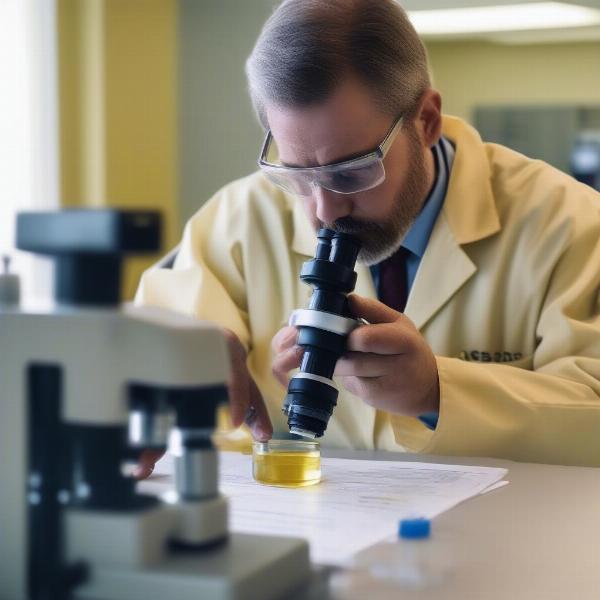Urinary crystals in dogs can be a painful and recurring problem. Choosing the right dog food for urinary crystals is crucial in managing this condition and preventing future episodes. This guide will delve into the different types of crystals, explain how diet plays a vital role, and offer recommendations for the best dog food for urinary crystals, empowering you to make informed decisions for your furry friend’s health.
Understanding Urinary Crystals in Dogs
Urinary crystals form when certain minerals become concentrated in the dog’s urine. These crystals can irritate the bladder lining, causing discomfort and potentially leading to infections or even bladder stones. Several factors can contribute to crystal formation, including genetics, breed predisposition, pH imbalances in the urine, and, importantly, diet.
Different types of crystals exist, including struvite, calcium oxalate, and urate. Each type requires a specific dietary approach to manage effectively. Your veterinarian can diagnose the type of crystals your dog has through urinalysis and recommend the appropriate dietary changes.
How Diet Influences Urinary Crystal Formation
Diet plays a significant role in both the formation and prevention of urinary crystals. What your dog eats directly impacts the pH of their urine, the concentration of minerals, and their overall urinary health. Foods high in certain minerals, such as magnesium, phosphorus, and calcium, can contribute to crystal formation in susceptible dogs.
Choosing the Best Dog Food for Urinary Crystals
Choosing the right dog food is paramount for managing urinary crystals. Therapeutic diets, often prescribed by veterinarians, are specifically formulated to dissolve certain types of crystals and prevent their recurrence. These diets usually control mineral content, adjust urine pH, and promote increased water intake.
Struvite Crystals:
For struvite crystals, the goal is to create a more acidic urine environment to dissolve the crystals. Therapeutic diets for struvite crystals typically have reduced magnesium, phosphorus, and protein levels.
Calcium Oxalate Crystals:
For calcium oxalate crystals, the aim is to reduce calcium intake and increase urine volume. These diets often contain restricted levels of calcium and oxalate and encourage water consumption through increased sodium content.
Urate Crystals:
Diets for urate crystals focus on reducing purine intake, as purines are metabolized into uric acid, which can form urate crystals. These diets typically have low purine content and promote alkaline urine.
 Veterinarian analyzing a dog's urine sample
Veterinarian analyzing a dog's urine sample
Beyond Commercial Dog Food: Other Considerations
While commercial dog food plays a critical role, other factors contribute to urinary health:
- Increased Water Intake: Encourage your dog to drink more water by providing fresh water at all times, adding water to their food, or using a pet water fountain.
- Regular Veterinary Checkups: Regular monitoring through urinalysis is essential to track progress and adjust the diet as needed.
- Avoid Treats High in Minerals: Be mindful of treats and supplements, as some can contribute to crystal formation. Consult your veterinarian for safe treat options.
What to Look for in Dog Food for Urinary Crystals
When choosing a dog food for urinary crystals, look for:
- Veterinary Approval: Opt for a diet formulated by veterinary nutritionists and approved by the Association of American Feed Control Officials (AAFCO).
- Specific Formulation: Ensure the food is explicitly designed for the specific type of crystal your dog has.
- Controlled Mineral Content: Check for controlled levels of magnesium, phosphorus, calcium, and purines, depending on the crystal type.
- Urine pH Adjustment: The food should aim to create a urine pH that discourages crystal formation.
Conclusion
Choosing the right dog food for urinary crystals is a crucial step in managing this condition and ensuring your dog’s comfort and well-being. Consult your veterinarian for a proper diagnosis and tailored dietary recommendations. By understanding the role of diet and selecting an appropriate food, you can help your furry companion live a healthier, happier life free from the discomfort of urinary crystals.
FAQ
- What are the signs of urinary crystals in dogs? Signs include frequent urination, straining to urinate, blood in the urine, and licking the genital area.
- Can I treat urinary crystals at home? No, it’s essential to consult a veterinarian for diagnosis and treatment. Home remedies can be ineffective and potentially harmful.
- How long does it take for a special diet to dissolve crystals? It can take several weeks or even months for a therapeutic diet to dissolve crystals and prevent recurrence.
- Are all dogs with urinary crystals prone to bladder stones? While urinary crystals can lead to bladder stones, not all dogs with crystals will develop them.
- Can I switch my dog’s food suddenly to a urinary health formula? Gradual transition is recommended to avoid digestive upset. Mix increasing amounts of the new food with the old food over 7-10 days.
- What if my dog refuses to eat the prescribed food? Consult your veterinarian. They may suggest ways to make the food more palatable or recommend alternative options.
- Are there any natural remedies to prevent urinary crystals? While some supplements claim to support urinary health, consult your vet before using any, as they can interact with prescribed medications.
Suggested Further Reading on ILM Dog
- [Link to relevant article on dog nutrition]
- [Link to relevant article on dog health]
About ILM Dog
ILM Dog (ilmdog.com) is your trusted international resource for comprehensive dog care information. We offer expert advice on breed selection, health, training, nutrition, grooming, and much more. From puppy care to senior dog needs, we provide practical guidance to help you navigate every stage of your dog’s life. For personalized support and product recommendations tailored to your dog’s unique needs, contact our team of experts at [email protected] or call us at +44 20-3965-8624.